To accompany your Come Follow Me study for January 17-23
In addition to reading the indicated chapters, you may enjoy:
- Study aids from Book of Mormon Central at https://bookofmormoncentral.org/come-follow-me/old-testament/come-follow-me-2022-genesis-5-moses-6
- The video Come Follow Me LDS 2022 (Jan 17-23) Genesis 5; Moses 6 | Enoch, Walk With Me at https://www.youtube.com/watch?v=REYhRxL-gds
If you would like a Kahoot game related to this material which you could use for personal study or use with your family or your class, click here: https://create.kahoot.it/share/genesis-5-and-moses-6/af50bb46-4610-4334-b978-6021eca802ef
Points to Ponder in Genesis 5 and Moses 6
1. What helpful missionary scripture can you find in Genesis 5? Can you give a mini-sermon using it?
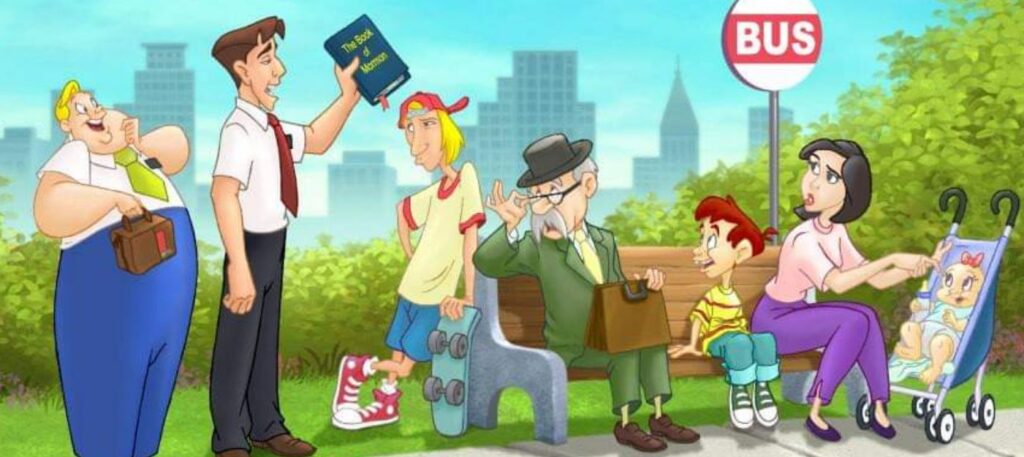
2. What is the main thing missing from Genesis 5 that modern revelation restores?
3. What are the most interesting facts you see as you study the following chart of the lives of the early patriarchs?
Longevity of the Patriarchs
| Name | Year born | Year died according to the Bible | Age at death according to the Bible | Age at death according to the Joseph Smith Translation | Age when Zion was translated |
| Adam | 0 | 930 | 930 | 1000 | ———— |
| Seth | 130 | 1042 | 912 | 981 | 822 |
| Enos | 235 | 1140 | 905 | 940 | 717 |
| Cainan | 325 | 1235 | 910 | 957 | 627 |
| Mahalaleel | 395 | 1290 | 895 | 945 | 557 |
| Jared | 460 | 1422 | 962 | 962 | 492 |
| Enoch | 522 | 887* | 365* | 430* | 430 |
| Methuselah | 587 | 1556 | 969 | 1000 | 365 |
| Lamech | 774 | 1551 | 777 | 777 | 178 |
| Noah | 956 | 1906 | 950 | 950 |
* = translated. The JST indicates he was 430 rather than 365 when translated in the year 952.
4. How do you account for men living so long anciently?
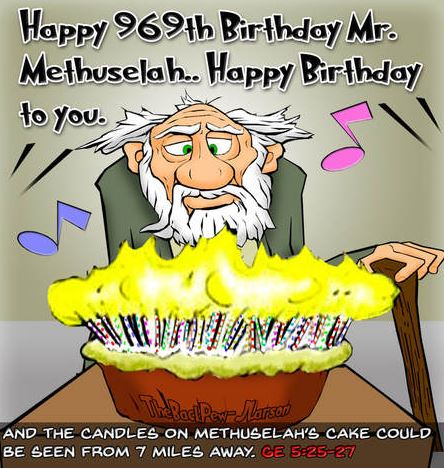
5. Since Seth, Enos, Cainan, Mahalaleel, and Jared were all evidently preachers of righteousness and all were alive at the time Enoch’s Zion was translated, why were they not part of that holy city and why were they not translated at the same time?
6. Why would you suppose Methuselah died in the year of the flood? (Genesis 5:27.) Could he have drowned? Might he have been translated? Or did he simply die of old age?
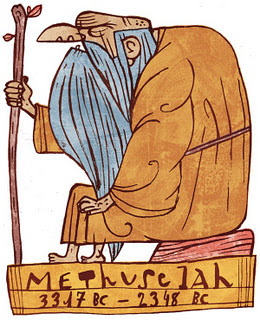
7. Why was Adam so happy to have Seth born as a replacement for Abel, when he already had many sons and daughters? (Moses 6:2)
8. What interesting parallel can you see between the lives of Adam and Abraham?
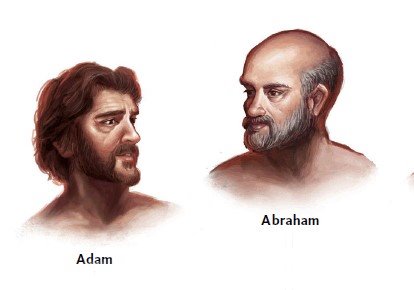
9. What do we know about the “book of remembrance” which was evidently kept by our earliest ancestors, and what implications does it have for us?
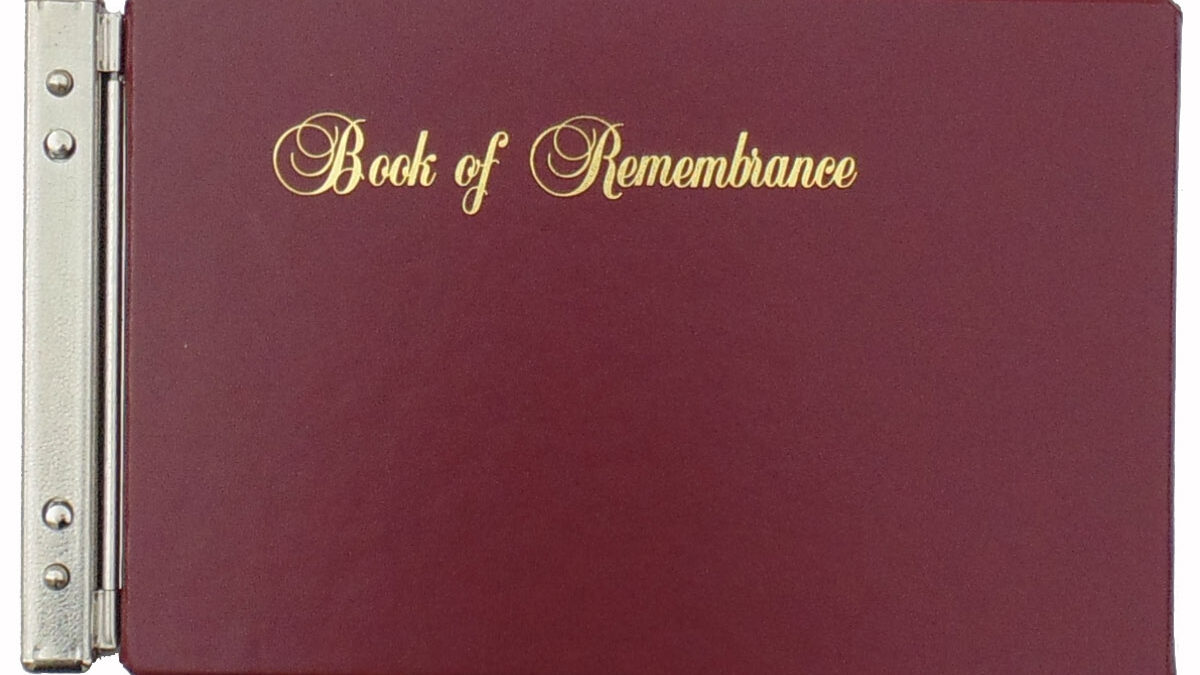
10. Agree or disagree, and why: Our personal histories will be to our own posterity what our current standard works are to us.

11. What would a “pure and undefiled” language be? One with no swear words? One with no irregular spelling or complicated rules of grammar? Since we live in the times of “restitution of all things,” does this mean we’ll eventually have to become bilingual and learn the language of Adam?
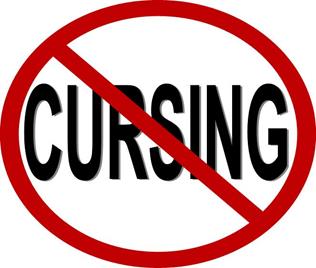
12. How many examples can you point to in Moses 6 of the influence of good teaching?

13. What did the Lord mean in 6:27 when he gave a negative analysis of the people’s eyesight?

14. How old was Enoch when he complained to the Lord that he was only “a lad” and thus too young to be called on such a mission as the Lord proposed to give him?

15. What significance for missionaries and sacrament meeting speakers may there be in the sequence the Lord outlines in 6:32: “Open thy mouth, and it shall be filled”?

16. How is 6:33 similar to but different from Joshua’s famous plea in Joshua 24:15?
17. What does the word “justify” mean in the Lord’s promise to Enoch in 6:34?
18. Who else do we remember having had experiences similar to those Enoch is recorded as having in Moses 6:36?
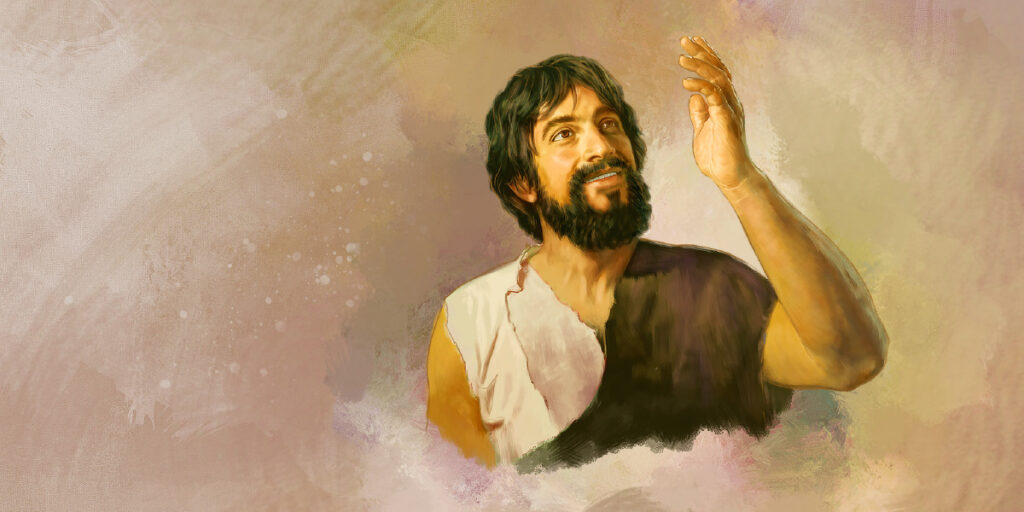
19. How could Enoch keep his emotional balance and maintain any feeling of self-esteem when everyone initially thought him both repulsive and crazy? (6:37-38)
20. What was there in what Enoch said in 6:41-46 that should have caused the people to tremble in 6:47?
21. If Joseph Smith was aware of Moses 6:54 in 1830, why should he have been so surprised to learn the same thing in 1836 in D&C 137:5-10?
22. In what sense are children “conceived in sin”? (6:55) Doesn’t this sound like apostate theology?
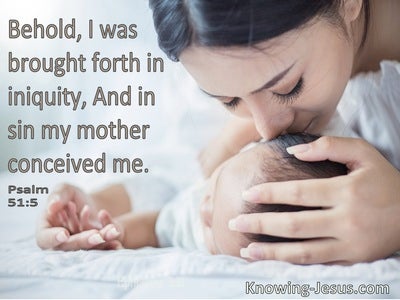
23. What cross reference might properly be written next to the last half of 6:55?
24. What new insight do we get from Moses 6:57 about the meaning of the term “Son of man,” by which Jesus so frequently referred to Himself during His mortal ministry?
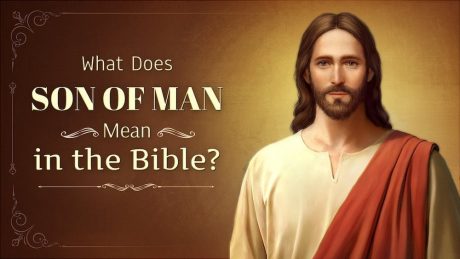
25. Can you more clearly explain the analogy between physical and spiritual birth as given in 6:59?

26. What would it mean to “enjoy the words of eternal life” in this world? (6:59) That we might like General Conference? Not go to sleep in sacrament meeting?
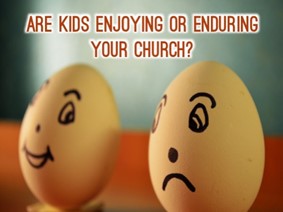
27. How might 6:61 qualify God’s omnipotence?
28. What do you understand 6:63 to mean when it says that “all things bear record of” God?
29. What was so unique about Adam’s baptism and confirmation? Why are the ordinances performed differently today?
30. What do we know about the Book of Enoch, which is not part of our standard works today but is mentioned in D&C 107:56-57 and apparently quoted in Jude 1:14-15?
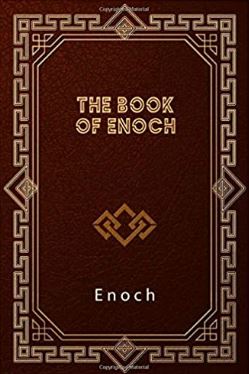
Possible Answers to Points to Ponder in Genesis 5 and Moses 6
1. What helpful missionary scripture can you find in Genesis 5? Can you give a mini-sermon using it?
These verses suggest that God’s creation of man in His own likeness was just as literal as Adam’s begetting Seth “in his own likeness, after his image.” If we are to understand from this that Seth looked very much like his father, then it is reasonable to conclude that we are also being taught that we also look very much like our Father in Heaven.
Moses 6:9, which is the Joseph Smith Translation of Genesis 5, is even more explicit, specifying that Got created man “in the image of his own body, male and female,” leaving no doubt that God does have a body and that there are both male and female bodies in the heavens.
2. What is the main thing missing from Genesis 5 that modern revelation restores?
A more detailed account of Enoch, his visions, his preaching, and the city of Zion.
3. What are the most interesting facts you see as you study the following chart of the lives of the early patriarchs?
Longevity of the Patriarchs
| Name | Year born | Year died according to the Bible | Age at death according to the Bible | Age at death according to the Joseph Smith Translation | Age when Zion was translated |
| Adam | 0 | 930 | 930 | 1000 | ———— |
| Seth | 130 | 1042 | 912 | 981 | 822 |
| Enos | 235 | 1140 | 905 | 940 | 717 |
| Cainan | 325 | 1235 | 910 | 957 | 627 |
| Mahalaleel | 395 | 1290 | 895 | 945 | 557 |
| Jared | 460 | 1422 | 962 | 962 | 492 |
| Enoch | 522 | 887* | 365* | 430* | 430 |
| Methuselah | 587 | 1556 | 969 | 1000 | 365 |
| Lamech | 774 | 1551 | 777 | 777 | 178 |
| Noah | 956 | 1906 | 950 | 950 |
* = translated. The JST indicates he was 430 rather than 365 when translated in the year 952.
Some of my observations would be:
- According to the Bible, the first 9 generations (Adam through Lamech) would have been alive simultaneously. According to the JST, even Noah would have been born 44 years prior to Adam’s death.
- All of Enoch’s six generations of paternal ancestors plus his son, Methuselah, and his grandson, Lamech, would have been alive at the time Enoch’s city of Zion was translated, raising interesting questions as to why none of them but Enoch was part of that city, even though they were righteous men.
- For whatever reason, the amended ages of many of the patriarchs, as shown in the Joseph Smith Translation, were not carried over into the Book of Moses in the Pearl of Great Price.
- Rather than Methuselah’s holding the record for longevity with an age of 969, according to the JST he and Adam would have tied with lifespans of 1000 years each. Edward Stevenson, an early Church member, pioneer, and member of the First Council of the Seventy, wrote that Joseph Smith had taught that Adam “was within 6 month of 1000 years old, which is one day with the Lord’s time thus fulfilling the Lords decree in the day thou eatest of the fruit of that tree thou shalt surely die and he did 6 months before the day was out.” Interestingly, there are also medieval Jewish and Islamic traditions affirming that Adam had lived for a thousand years.
- According to the Biblical record, Methuselah would have died the same year as the Flood. According to the JST, he would have survived the Flood by 31 years. This, however, would raise some interesting questions, as there is no record of his having been on the ark. Perhaps, just as Joseph Smith suggested other early dates in the Bible were inaccurate, the traditional date of the Flood is as well.
- All of the early patriarchs are shown as living much longer lives than did their posterity after the Flood.
4. How do you account for men living so long anciently?
See Thomas R. Valleta’s article on the subject at https://abn.churchofjesuschrist.org/study/ensign/1994/02/i-have-a-question/why-did-adam-and-his-descendants-live-so-long?lang=eng for some possibilities.
Many non-Latter-day Saint creationists have proposed that Genesis 1:6-7 speaks of a somewhat permanent cloud cover prior to the flood, which shielded the earth and its inhabitants from the harmful rays of the sun. The condensation of that cloud cover, they theorize, provided much of the water for the great flood, and its removal then subjected mankind to a less healthful environment, with consequently decreasing lifespans. See for example https://answersareallinthebook.wordpress.com/2016/11/26/how-did-the-biblical-patriarchs-live-so-long/
5. Since Seth, Enos, Cainan, Mahalaleel, and Jared were all evidently preachers of righteousness and all were alive at the time Enoch’s Zion was translated, why were they not part of that holy city and why were they not translated at the same time?
We don’t really know, but it would stand to reason that the Lord would not want to remove all of the righteous from the earth at once, or there would be no one left to preach to the wicked. Zion was evidently not intended to be the abode of all the good people of that day but was a unique city with a special destiny, perhaps to show the world what is possible if a society will unitedly live the gospel in its fulness.
6. Why would you suppose Methuselah died in the year of the flood? (Genesis 5:27.) (See chart above.) Could he have drowned? Might he have been translated? Or did he simply die of old age?
We are not sure, and the answer isn’t particularly important. Since he was a righteous man, it is quite certain that the Lord didn’t allow him to drown in the flood. It is quite possible that the Lord mercifully let him die of old age shortly before the flood, so that he wouldn’t have to endure the hardships of months on turbulent seas as a 969 year old man. It is also possible the Lord chose to translate him and take him to live with his righteous father and his city. Moses 7:27 gives us to understand that many righteous individuals subsequent to the translation of Enoch’s city were “caught up by the powers of heaven into Zion,” and it is hard to think of one more deserving of that than Enoch’s own son, Methuselah.
7. Why was Adam so happy to have Seth born as a replacement for Abel, when he already had many sons and daughters? (Moses 6:2)
While Adam had several sons previously besides Abel, Abel seems to have been the only righteous priesthood holder among them. (Moses 5:12-13, 27, 42, 51; 6:4.) Adam thus viewed Seth not just as one more child but as a potential specific replacement for Abel, who could keep the priesthood lineage alive in the earth. Moses 6:3 shows that his hope was not in vain.
8. What interesting parallel can you see between the lives of Adam and Abraham?
Besides the fact that both were faithful in general, we might point out that both had to wait a long time for a righteous heir.
9. What do we know about the “book of remembrance” which was evidently kept by our earliest ancestors, and what implications does it have for us?
The term, as used by many Latter-day Saints, once referred to a binder with pedigree charts and family group sheets. But to the earliest patriarchs, it was obviously more of an inspired family history and written record of God’s revelations. And it appears to have been their primary “school book.” We read that “it was given unto as many as called upon God to write by the spirit of inspiration; And by them their children were taught to read and write, having a language which was pure and undefiled.” (Moses 6:5-6.)
Interestingly, even though Adam was still alive for the first 408 years of Enoch’s life, and although Enoch was ordained by Adam at age 25 and blessed by Adam again when he was 65 (D&C 107:49) it appears that Enoch may not have had frequent contact with him otherwise. “Nevertheless we know them,” Enoch wrote, “and cannot deny, and even the first of all we know, even Adam. For a book of remembrance we have written among us, according to the pattern given by the finger of God; and it is given in our own language.” (Moses 6:45-46.) Presumably, family reunions of the entire posterity of Adam were infrequent in those days, and distances were such as to preclude regular association. The written record passed down from Adam’s time thus took on special significance.
We would do well similarly to keep records of our ancestors, especially spiritual experiences they may have had, as well as to record our own. While family history is sometimes thought of as primarily a means of providing proxy ordinances for those who did not have the opportunity in this life, it is equally important to preserve memories in the Memories section of FamilySearch for the benefit of those who will follow after us.
10. Agree or disagree, and why: Our personal histories will be to our own posterity what our current standard works are to us.
This is probably partially, but only partially, true. Our personal and family histories may never be regarded as “standard works” in the sense of being officially binding upon the Church, but they can and should contain the same kind of inspiring testimonies of God’s reality and goodness. And some of our posterity initially may be more interested in reading our family histories than in reading the official scriptures of the Church.
11. What would a “pure and undefiled” language be? One with no swear words? One with no irregular spelling or complicated rules of grammar? Since we live in the times of “restitution of all things,” does this mean we’ll eventually have to become bilingual and learn the language of Adam?
The scriptures are not clear on this point, but a pure and undefiled language might well have included both of the benefits suggested above. Or, it could simply be contrasting Adam’s language with that of the lesser languages resulting from the confusion of tongues at the Tower of Babel. Despite Zephaniah 3:9, the scriptures are not clear whether Adam’s language will be restored or, if so, when. But it is not unreasonable to think that during the Millennium we could have the privilege of learning and using such a superior language as his must have been, having been taught it by God Himself.
12. How many examples can you point to in Moses 6 of the influence of good teaching?
- 6:6–Adam and Eve taught their children to read and write and left them a written record out of which they could study.
- They tried to teach all their children to repent, though few did (6:1).
- Seth taught Enos (6:13)
- Jared taught Enoch (6:21, 41)
- All of Adam’s righteous line were preachers of righteousness and taught faith (6:23)
- Enoch exhorted his listeners to teach their children (6:57, 58)
- Enoch himself taught so effectively that, as we’ll see in chapter 7, his entire city became worthy of translation.
13. What did the Lord mean in 6:27 when he gave a negative analysis of the people’s eyesight?
Not being able to see “afar off” could mean not perceiving or thinking about a pre-mortal life nor a post-mortal life or even one’s mortal future but living only for the here and now.
14. How old was Enoch when he complained to the Lord that he was only “a lad” and thus too young to be called on such a mission as the Lord proposed to give him?
Evidently at least 65! (Moses 6:25.)
15. What significance for missionaries and sacrament meeting speakers may there be in the sequence the Lord outlines in 6:32: “Open thy mouth, and it shall be filled”?
The Lord seems to want us to demonstrate our faith by taking the first step. Sometimes we hesitate to speak up about the Church because we don’t know what to say. But the Lord says we need to have the faith to start, and He’ll help us know what to say next.
16. How is 6:33 similar to but different from Joshua’s famous plea in Joshua 24:15?
In Joshua it could sound as though either option was acceptable, but in Moses the exhortation is not to choose freely but to choose to obey.
17. What does the word “justify” mean in the Lord’s promise to Enoch in 6:34?
It seems to mean that the Lord will honor Enoch’s words by
- fulfilling his prophecies and promises
- causing his decrees to be accomplished
- bearing witness through the Spirit that his words are true.
18. Who else do we remember having had experiences similar to those Enoch is recorded as having in Moses 6:36?
Moses, for one (Moses 1:27-28). The brother of Jared evidently had a similar experience. (Ether 3:25.)
19. How could Enoch keep his emotional balance and maintain any feeling of self-esteem when everyone initially thought him both repulsive and crazy? (6:37-38)
Only through knowing that the course of life he was pursuing was agreeable to God and through having God’s Spirit with him. In the Lectures on Faith, which Joseph Smith either authored or approved, it states:
“Such was and always will be the situation of the saints of God, that unless they have an actual knowledge that the course that they are pursuing is according to the will of God, they will grow weary in their minds and faint; for such has been and always will be the opposition in the hearts of unbelievers and those that know not God, against the pure and unadulterated religion of heaven, (the only thing which ensures eternal life,) that they will persecute, to the uttermost, all that worship God according to his revelations, receive the truth in the love of it, and submit themselves to be guided and directed by his will, and drive them to such extremities that nothing short of an actual knowledge of their being the favorites of heaven, and of their having embraced that order of things which God has established for the redemption of man, will enable them to exercise that confidence in him necessary for them to overcome the world, and obtain that crown of glory which is laid up for them that fear God.” (6:4.)
“Let us here observe, that a religion that does not require the sacrifice of all things, never has power sufficient to produce the faith necessary unto life and salvation; for from the first existence of man, the faith necessary unto the enjoyment of life and salvation never could be obtained without the sacrifice of all earthly things: it was through this sacrifice, and this only, that God has ordained that men should enjoy eternal life; and it is through the medium of the sacrifice of all earthly things, that men do actually know that they are doing the things that are well pleasing in the sight of God. When a man has offered in sacrifice all that he has, for the truth’s sake, not even withholding his life, and believing before God that he has been called to make this sacrifice, because he seeks to do his will, he does know most assuredly, that God does and will accept his sacrifice and offering, and that he has not nor will not seek his face in vain.” (6:7)
20. What was there in what Enoch said in 6:41-46 that should have caused the people to tremble in 6:47?
No doubt it was not his words themselves but the power of the Spirit which accompanied them. See 2 Nephi 33:1. Also, 1 Nephi 16:2.
21. If Joseph Smith was aware of Moses 6:54 in 1830, why should he have been so surprised to learn the same thing in 1836 in D&C 137:5-10?
This may be additional evidence that the Prophet was the recipient but not the author of either Moses 6 or D&C 137. He probably did not grasp the full significance of all that he received until he had a chance to meditate upon it and fit it all together.
22. In what sense are children “conceived in sin”? (6:55) Doesn’t this sound like apostate theology?
David said much the same thing, of course, in Psalm 51:5, prompting Joseph Fielding Smith to respond, “David was not conceived in sin no matter what he says.” The phrase can be understood to mean, however, simply that children are conceived into a world abounding in sin, not that somehow they themselves are sinful from the moment of conception or that there is something inherently sinful in human reproduction.
23. What cross reference might properly be written next to the last half of 6:55?
How about 2 Nephi 2:11?

24. What new insight do we get from Moses 6:57 about the meaning of the term “Son of man,” by which Jesus so frequently referred to Himself during His mortal ministry?
As used by the Savior, rather than a proclamation of his humanity, this could be a testimony that his Father in Heaven is an exalted, glorified man.
25. Can you more clearly explain the analogy between physical and spiritual birth as given in 6:59?
Just as a baby leaves the “water” or amniotic fluid, with some shedding of his mother’s blood, and with a spirit inside him, so do those who are “born again” come to that state through the waters of baptism, the blood of Christ, and the Holy Spirit.
26. What would it mean to “enjoy the words of eternal life” in this world? (6:59) That we might like General Conference? Not go to sleep in sacrament meeting?
While it could include both, it more likely means that we can individually enjoy personal revelation.
27. How might 6:61 qualify God’s omnipotence?
God has “all power” only according to “wisdom, mercy, truth, justice, and judgment,” which could be another way of saying He has all the power there is, but that there are some things even God cannot do, such as to save a man against his will, eliminate all evil from the world without seriously interfering with more important purposes of life, or do something which by definition is impossible, such as making a rock so big He couldn’t lift it.
27. What do you understand 6:63 to mean when it says that “all things bear record of” God?
Perhaps it is saying that nature itself, in its beauty, order, and complexity, testifies to the existence of a divine creator. It is also true that all gospel ordinances symbolize him, as all prophets have testified of him.
28. What was so unique about Adam’s baptism and confirmation? Why are the ordinances performed differently today?
There was no other human around with divine authority, so Adam was immersed by the Spirit of the Lord and was filled with the Spirit without an actual ordinance of confirmation. We do it differently today so that we can serve each other by administering those ordinances to our fellow men.
29. What do we know about the Book of Enoch, which is not part of our standard works today but is mentioned in D&C 107:56-57 and apparently quoted in Jude 1:14-15?
Dr. Hugh Nibley wrote:
Early Christian writers knew all about the book of Enoch: Indeed, “nearly all the writers of the New Testament were familiar with it, and … it had all the weight of a canonical book” [R. H. Charles, The Book of Enoch (1913), ix]. Its influence is apparent in no less than 128 places in the New Testament … [But to the apostate Christian church, Enoch] “contained much of a questionable character,” writes R. H. Charles with a sigh, “and from the fourth century of our era onward it fell into discredit; and under the ban of such authorities as Hilary, Jerome, and Augustine, it gradually passed out of circulation, and became lost to the knowledge of Western Christendom” [The Book of Enoch, ix]. … They were all learned schoolmen steeped in the rhetorical and sophistic education of the time, admitting quite freely that the Christians of an earlier time held ideas and beliefs quite different from theirs. They also knew that Enoch was treasured as a canonical book by the early Christians, but they would have none of it. … “From the 4th century on, the Latin Church ceased to concern itself” with Enoch [cited in J.- P. Migne, Dictionnaire des Apocryphes, 2 vols. (1856), 1:396].
A downloadable version of the apocryphal Book of Enoch may be found at https://book-ofenoch.com/download-pdf-file/. In its present form, it dates only to a couple of centuries before Christ, but its origin and ideas could be considerably more ancient. It is not at all clear that this is the book to which D&C 107 refers, but Jude’s quote does appear therein.
